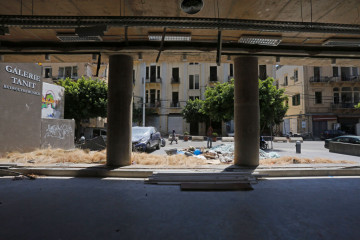

Homes, restaurants, bars and art galleries have always been an important part of the vibrant structure of Mar Mikhael, one of the neighbourhoods most affected by Beirut's August 4 explosion. Less than a year later and after spending months on reconstruction and reviving their love of art, the area is ready to reopen.
Under the theme of Togetherness, Tanit Gallery opened its doors to the public in June in hopes of healing and moving forward after the explosion that completely destroyed the building, severely injured several employees and killed the building’s architect Jean-Marc Bonfils.
“The day before the opening, there were still workers inside,” communications and project officer Elige Abou Youness told The New Arab. “The decision to open again wasn’t hard. As a team, we decided that what we need is to come back as a community in Mar Mikhael and restart the work. And after the explosion, in the midst of the pandemic and the financial crisis, all that matters is to be together.”
The team, therefore, decided to launch an open call under the theme to explore ways that people can be connected. They received 61 applications within a month, of which they selected 17 to be exhibited in June. Eliesh, one of the artists, showed a video on the October 17 Revolution from the perspective of people’s feet, walking together, while two photographers chose to highlight the inflation of the Lebanese currency by showing how much it was worth at each phase.
“It’s very important to be here and together, a concept that was challenged with everything that happened in Lebanon in the past two years,” Abou Youness said. “It was definitely hard to be back in a space that was destroyed and where people died but it’s also important to showcase artists and art. We work hard for that message – stopping is not an option.”
The Tanit Gallery has relied on its own funds to rebuild, just like most spaces around them that didn’t get any help from the government or their insurance company. It is the same fate that Marfa’ Gallery suffered.
Marfa’, which means port in Arabic, shared a wall with the port and three of its walls had to be removed and rebuilt. Their office was also completely crushed. “Luckily we were off that week because of Covid restrictions,” the gallery's director Laetitia Zalloum told The New Arab.
|
They reopened in May with a group exhibition, gathering almost all their artists. “The owner said from day one that we would reopen, but it was very challenging because of the financial crisis and the pandemic, there was a lot of delays,” Zalloum recalled. “In the end, the artists really pushed for us to go forward and continue. It’s not the same as before, but I feel that people want to come back to exhibitions and galleries.”
Most of the galleries continued working during that time, remotely, in other spaces or through international events and networks. Some also held fundraising exhibitions, like Tanit which had a “forced open” exhibition for an artist who had lost his work when the explosion happened.
Artlab held a fundraising event in December 2020 but in a smaller space than the one they used to occupy. The gallery was completely destroyed by the explosion and is now rebuilt, but has become too expensive for the organisation to rent as it was already struggling because of the financial crisis.
“We relocated in a small space behind the gallery, where we also have a workshop,” artist Tarek Mourad, who works with Artlab, told The New Arab. “Antoine [Haddad, the owner] wanted to close down at first, but we decided instead to review our priorities and change our way of working.”
Artlab has now turned to a new model of work based on helping newcomer artists who didn’t have a chance to exhibit before and allowing them to display their art through open calls. “Doing what we used to doesn’t work in times of crisis,” Mourad said. “We just hope that we will be able to exhibit soon, which has been hard to plan due to the ongoing health situation."
More than anything, what matters to people involved in galleries, art and culture in Beirut is to continue existing and being part of the city’s life, even if it has become less vibrant than two years before.
“It is important that we stay here so that this social fabric doesn’t disappear,” Zalloum concludes. “At the end of the day, we have to continue, because that’s what we do.”
|
|
Florence Massena is a freelance journalist based in Norway after six years spent in Lebanon. She reports on the environment, women's issues, human rights and refugees in the Middle East, Africa and Europe
Follow her on Twitter: @FlorenceMassena




 Follow the Middle East's top stories in English at The New Arab on Google News
Follow the Middle East's top stories in English at The New Arab on Google News


